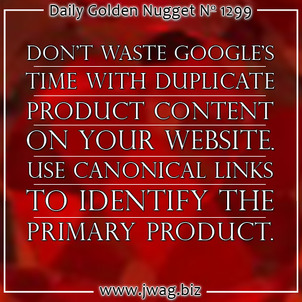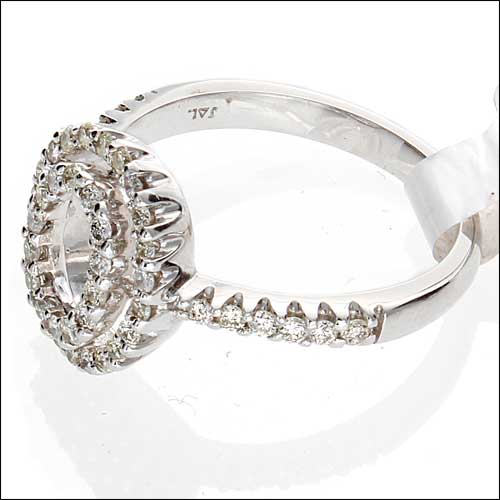
In this edition of Throwback Thursday, I'm jumping back about 1,100 days to Nugget No 199 and the topic of duplicate product content.
Conversations about duplicate content range from dealing with multiple domain names to modifying URL structures and a lot more.
The topic of duplicate product content is inherent in most online product catalogs. It usually happens when you put a single product into multiple product categories.
What product categories would you put this ring in?

It would make sense if a user found this ring in:
- Rings
- Engagement Rings
- Halo Engagement Rings
- Diamond Engagement Rings
However, in most online product catalogs if you include that single item into 4 categories will create 4 different pages on the website; only one is needed and the other three are duplicates.
I've seen websites that have 100 unique engagement rings duplicated 5 and 6 times each. That's 700 different pages that Google would spider and index, and that's where the problem is. The computer time to process all those duplicate pages is, well, a waste of time. Wasted computer time turns into wasted air conditioning, which means wasted electricity and higher costs for Google. We're talking about pennies, but it does add up very quickly.
If you waste Google's time and money, they will penalize you by lowering your ranking. That's why you need to prevent duplicate product content on your website.
Duplicate Product Solution
The solution to this problem should be built into all online product catalogs now, but it's surprising how many still don't have this feature.
The solution is to designate a single URL for the product and make sure you tell Google to ignore all other occurrences of the product found on the website. You do that with something called a Canonical Link.
This is what it looks like:
<link rel=“canonical”>
It's a hidden line of code that you have to insert on all your duplicate product pages.
More specifically, for the above ring it might look like this:
<link rel="canonical" href="http://www.jewelrystore.com/halo-engagement-ring.htm">
You'd have to ask your website programmer to include that line of HTML code at the top of every page whenever that product appears. This is easy to do with a little bit of script writing.
Closing Thoughts
Websites plagued with duplicate product content will take a long time to clean up. Once Google realizes it has indexed 700 or more pages of duplicate content, it will start to ignore those pages, and likely lower your ranking because of it.
Google attempts to reread the entire internet every 3 days, but they will take a very long time to return to and re-read pages they are ignoring.
It can take years, and I do mean years, for Google to reread those ignored pages.
Google won't discover your Canonical Link corrections until it rereads your pages. Sadly, that also means that your ranking will be depreciated until the discovery process is complete.
This is why cleaning up the duplicate product content on your website is so important, and so difficult to accomplish.








